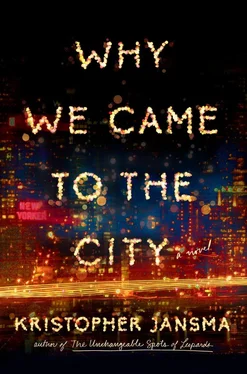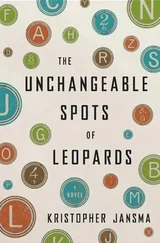Kristopher Jansma
Why We Came to the City
We do have Prayers, you know, Prayers for forgiveness,
daughters of mighty Zeus. . and they limp and halt,
they’re all wrinkled, drawn, they squint to the side,
can’t look you in the eyes, and always bent on duty,
trudging after Ruin, maddening, blinding Ruin.
But Ruin is strong and swift—
She outstrips them all by far, stealing a march,
leaping over the whole wide earth to bring mankind to grief.
And the Prayers trail after, trying to heal the wounds.
— Homer, The Iliad (trans. Robert Fagles)
What can go wrong will go wrong.
— Murphy’s First Law
We came to the city because we wished to live haphazardly, to reach for only the least realistic of our desires, and to see if we could not learn what our failures had to teach, and not, when we came to live, discover that we had never died. We wanted to dig deep and suck out all the marrow of life, to be overworked and reduced to our last wit. And if our bosses proved mean, why then we’d evoke their whole and genuine meanness afterward over vodka cranberries and small batch bourbons. And if our drinking companions proved to be sublime, then we would stagger home at dawn over the Old City cobblestones, into hot showers and clean shirts, and press onward until dusk fell again. For the rest of the world, it seemed to us, had somewhat hastily concluded that it was the chief end of man to thank God it was Friday and pray that Netflix would never forsake them.
Still we lived frantically, like hummingbirds; though our HR departments told us that our commitments were valuable and our feedback was appreciated, our raises would be held back another year. Like gnats we pestered Management — who didn’t know how to use the Internet, whose only use for us was to set up Facebook accounts so they could spy on their children, or to sync their iPhones to their Outlooks, or to explain what tweets were and, more importantly, why —which even we didn’t know. Retire! , we wanted to shout. Get out of the way with your big thumbs and your senior moments and your nostalgia for 1976! We hated them; we wanted them to love us. We wanted to be them; we wanted to never, ever become them.
Complexity, complexity, complexity! We said let our affairs be endless and convoluted; let our bank accounts be overdrawn and our benefits be reduced. Take our Social Security contributions and let it go bankrupt. We’d been bankrupt since we’d left home; we’d secure our own society. Retirement was an afterlife we didn’t believe in and that we expected yesterday. Instead of three meals a day, we’d drink coffee for breakfast and scavenge from empty conference rooms for lunch. We had plans for dinner. We’d go out and buy gummy pad thai and throat-scorching chicken vindaloo and bento boxes in chintzy, dark restaurants that were always about to go out of business. Those who were a little flush would cover those who were a little short, and we would promise them coffees in repayment. We still owed someone for a movie ticket last summer; they hadn’t forgotten. Complexity, complexity.
In holiday seasons we gave each other spider plants in badly découpaged pots and scarves we’d just learned how to knit and cuff links purchased with employee discounts. We followed the instructions on food and wine Web sites, but our soufflés sank and our baked bries burned and our basil ice creams froze solid. We called our mothers to get recipes for our old favorites, but they never came out the same. We missed our families; we were sad to be rid of them.
Why shouldn’t we live with such hurry and waste of life? We were determined to be starved before we were hungry. We were determined to decrypt our neighbors’ Wi-Fi passwords and to never turn on the air-conditioning. We vowed to fall in love: headboard-clutching, desperate-texting, hearts-in-esophagi love. On the subways and at the park and on our fire escapes and in the break rooms, we turned pages, resolved to get to the ends of whatever we were reading. A couple of minutes were the day’s most valuable commodity. If only we could make more time, more money, more patience; have better sex, better coffee, boots that didn’t leak, umbrellas that didn’t involute at the slightest gust of wind. We were determined to make stupid bets. We were determined to be promoted or else to set the building on fire on our way out. We were determined to be out of our minds.
We couldn’t stop following the news. Every ten seconds we refreshed our browsers and gawked at the headlines. Dully, we read blogs of friends of friends of friends who had started an organic farm out on the Wachito River. They were out there pickling and canning and brewing things in the goodness of nature. And soon we’d worry it was time for us to leave the city and go. Go! To Uruguay or Morocco or Connecticut? To the Plains or the Mountains or the Bay? But we’d bide our time, and after some months or years, our farmer friends would give up the farm and begin studying for the LSATs. We felt lousy about this, and wonderful.
We missed getting mail. We wondered why we even kept those tiny keys on our crowded rings. Sometimes we would send ourselves things from the office. Sometimes we would handwrite long letters to old loved ones and not send them. We never knew their new address. We never knew anyone’s address, just their cross streets and what their doors looked like. Which button to buzz, and if the buzzers even worked. How many flights to climb, and which way to turn off the stairs. Sometimes we missed those who hadn’t come to the city with us — or those who had gone to other, different cities. Sometimes we journeyed to see them, and sometimes they ventured to see us. Those were the best of times, for we were all at home and not at once. Those were the worst of times, for we inevitably longed to all move here or there, yet no one ever came — somehow everyone only left. Soon we were practically all alone.
Soon we began to hate the forever cramping of our lives. Sleeping on top of strangers and sipping coffee with people we knew we knew but couldn’t remember where from. Living out of boxes we had no space to unpack. Soon we named the pigeons roosting in our windowsills; we worried they looked mangier than the week before. We heard bellowing in the apartments below us and bedsprings creaking in the ones above. Everywhere we saw people with dogs and wondered how they managed it. Did they work from home? Did they not work? Had they gone to the right schools? Did they have connections? We had no connections. Our parents were our guarantors in name only; they called us from their jobs in distant, colorless, suburban office parks and told us we could come home anytime, and this terrified us always.
But then came those nights, creeping up on us while we worked busily in dark offices, like submariners lost at sea, sailing through the dark stratosphere in our cement towers. We’d call each other to report: a good thing happened, a compliment had been paid, a favor had been appreciated, an inch of ground had been gained. We wouldn’t trade those nights for anything or anywhere. Those nights, we remembered why we came to the city. Because if we were really living, then we wanted to hear the cracking in our throats and feel the trembling in our extremities. And if our apartments were coffins and our desks headstones and our dreams infections — if we were all slowly dying — then at least we were going about that great and terrible business together.
Irene Richmond ran down the narrow foyer, helping guests get out of their coats, which were dusted with flakes of snow that had been coming down heavily all day and still drifted lightly onto the hotel balcony. Coats that cost more than she earned in a month and that were works of art themselves. Hoods lined with fox fur imported from Finland. A quilted sateen coat filled with goose down and patterned in the latest Japanese style of concentric circles. A long vest made of rabbit. Mongolian lamb’s wool. Irene got a thrill from just holding them, but it was always short-lived. By the time the guests had finished warning her not to crease the collars or wrinkle the hems, there was someone else making an even more fashionable entrance.
Читать дальше












